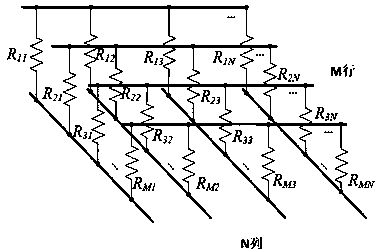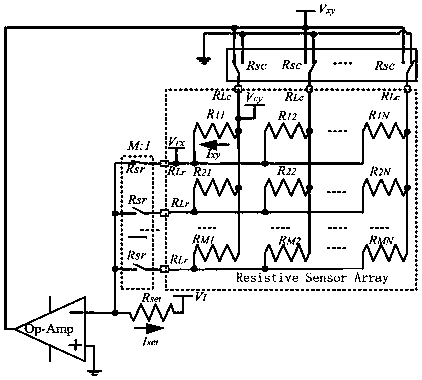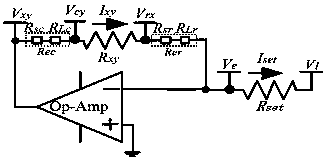Resistive sensor array readout circuit based on two-wire system equipotential method
A resistive sensor and readout circuit technology, applied in the sensor field, can solve the problems of destroying the ideal isolation feedback condition of the readout circuit, the influence of the test accuracy of the resistive sensor array, and the measurement error of the resistance value of the tested unit, etc. Resistance range, the effect of eliminating interference and eliminating crosstalk error
- Summary
- Abstract
- Description
- Claims
- Application Information
AI Technical Summary
Problems solved by technology
Method used
Image
Examples
Embodiment Construction
[0034] The technical scheme of the present invention is described in detail below in conjunction with accompanying drawing:
[0035] figure 2 It shows the principle of the equipotential method readout circuit of the existing shared row and column line resistive sensor array, and the current resistive sensor to be tested in the figure R xy for M x N shared row and column resistive sensor array R 11 , image 3 for figure 2 The equivalent diagram of the readout principle of the readout circuit. In this readout circuit, there is only one connection between each row or column line of the array and the test circuit. Under the ideal working condition of the circuit, the channel on-resistance of all the two-to-one multi-way switches of the column lines R sc , the cumulative resistance of the lead resistance of the drive connection line and the contact resistance of the connector R Lc is ignored like this R xy The voltage of the column line V cy =V xy , the voltage ...
PUM
 Login to View More
Login to View More Abstract
Description
Claims
Application Information
 Login to View More
Login to View More - R&D
- Intellectual Property
- Life Sciences
- Materials
- Tech Scout
- Unparalleled Data Quality
- Higher Quality Content
- 60% Fewer Hallucinations
Browse by: Latest US Patents, China's latest patents, Technical Efficacy Thesaurus, Application Domain, Technology Topic, Popular Technical Reports.
© 2025 PatSnap. All rights reserved.Legal|Privacy policy|Modern Slavery Act Transparency Statement|Sitemap|About US| Contact US: help@patsnap.com



